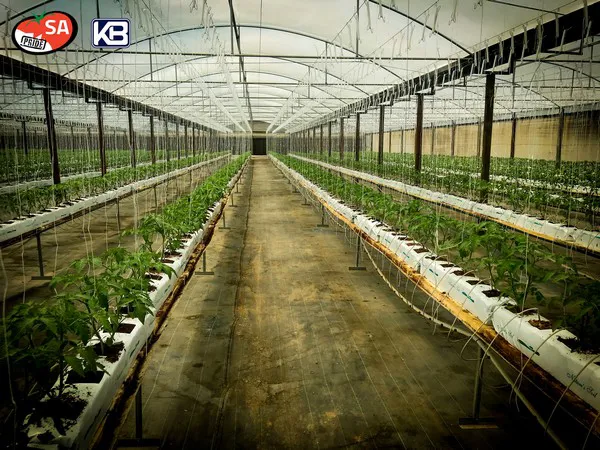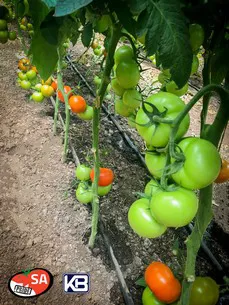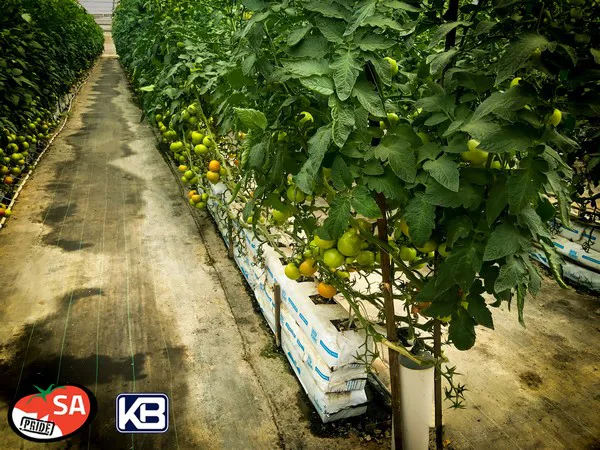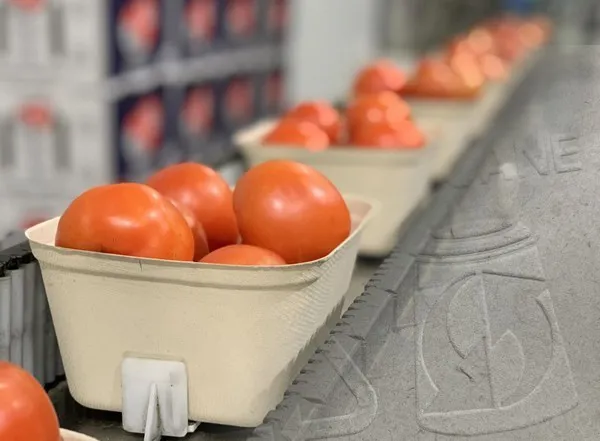The growing season for tomatoes in South Australia has not been without its challenges with very high temperatures which made it necessary to increase irrigation, but nevertheless have ensured a good quality of supply.
“The growing season in South Australia has been prosperous, particularly taking into consideration some of the weather that we have experienced,” according to Steve Tsakoumakis, Director of Sales and Marketing at Kapiris Bros. “In the earlier parts of this summer, we faced a few weather challenges of extremely hot temperatures with some days consecutively reaching 40°C and above. These conditions prompted us to take some measures such as adapting our scheduled water regime differently and performing our beneficial folia application prior, during and after these days with consistent heat.”

Despite the high temperatures the quality and volumes of the tomatoes have been very good. The hot temperatures caused the harvest volumes to fluctuate, which was anticipated said ?, but overall have been consistent.
“As environmental changes and pressures evolve, we look toward the future and continue to research and invest further into cooling systems to apply to all of our green houses. As much as we value traditional growing methods we do not want to solely rely on different growing techniques, but also incorporate the assistance of beneficial technology to ensure better quality and larger yields throughout the warmer months.”
Food service industry demand yet to return to pre-COVID-19 levels
 The food service industry in Australia has been hit hard by COVID-19. Restaurants, hotels, sporting venues etc, have stood empty for months. Businesses within the industry have attempted to move quickly to mitigate the impact, reducing staff and costs, pivoting online and adapting. Some greatly successful, others not adapting well, which in turn has led to closures. Food service industry demand has yet to return to pre-COVID-19 levels and businesses will need to manage the operational realities of a continually changing environment of dramatically lower revenues, high fixed costs, less than optimal asset returns and the need to conserve capital, they will need to determine which areas to prioritise and invest in.
The food service industry in Australia has been hit hard by COVID-19. Restaurants, hotels, sporting venues etc, have stood empty for months. Businesses within the industry have attempted to move quickly to mitigate the impact, reducing staff and costs, pivoting online and adapting. Some greatly successful, others not adapting well, which in turn has led to closures. Food service industry demand has yet to return to pre-COVID-19 levels and businesses will need to manage the operational realities of a continually changing environment of dramatically lower revenues, high fixed costs, less than optimal asset returns and the need to conserve capital, they will need to determine which areas to prioritise and invest in.
“The food service industry is gearing up to reopen their doors back to full capacity in a changed landscape that dramatically affected consumer behaviour and new habits. Consumer’s expectations have arisen, discretionary spending has suffered, and spending patterns have changed. Consumers may be slow to return to old habits and crowds, hence the food service industry biggest challenge is to manage the ongoing uncertainty and have the ability to quickly adapt accordingly.”
The demand for gourmet tomatoes has increased to its highest levels due to the unique benefits they provide. Consumers are eating and preparing meals at home more than ever before due to the current COVID-19 restrictions and increasing popularity associated with cooking shows.

“Gourmet tomatoes have the unique qualities of being the greatest versatile variety not only within the tomato category but also within the vegetable sector. Unlike other variants, the gourmet tomato can be used in a huge range of applications from sandwiches, salads, soups, right through to virtually all meal recipes. The versatility of the gourmet tomato provides a unique culinary experience like no other given its biggest feature of great taste. Gourmet tomato varieties have been grown to encapsulate a full flavour profile not found in any other tomato variant and can be used in a huge range of meal applications.”
Sugarcane pulp packaging
Kapiris Bros launched a new sugarcane pulp packaging back in March 2020, targeting one distribution centre to gauge feedback from customers and consumers.
This first stage of the launch received a great deal of positive feedback, which has driven the company to enter the second stage of the launch, which will see the sugarcane pulp packaging be adopted state by state across distribution centres and ultimately on a national level. A large portion of their efforts in 2020 involved optimising the performance of the sugarcane pulp packaging to ensure that it fits the needs of the supply chain, customers and consumers.

“Throughout the past 10 months of this first stage of our launch we have reduced our use of plastic by approx. 12 tonnes. This is less than half of the 31.5 tonnes we forecast to reduce over a 12 month period throughout 2021 and beyond as the sugarcane pulp packaging solution rolls out across Australia. As the shift towards sustainable packaging practices gradually becomes widely accepted and ultimately the gold standard across the fresh produce industry, we anticipate even further reductions in our use of plastic and welcome any innovations and solutions that our inventive and resourceful packaging suppliers have to share with us.”
The use of sugarcane pulp ultimately remains exclusive to the Gourmet and Roma Tomato categories.
“One thing we have been very cognisant of is that the sugarcane pulp trays and punnets are wrapped in a recyclable flow wrap. We saw this is an opportunity to once again work together with our packaging suppliers and collaborate in an attempt to reduce the amount of plastic that is being used within this recyclable flow wrap solution. The end result gave us a considerably less amount of plastic being used not only by ourselves, but our packaging suppliers. 2020 showed us that in the midst of a pandemic, sustainability was still at the forefront of ours, our customers and ultimately the consumer’s minds. What we also gained a more intimate understanding of is that consumers demand food safety measures and value purchasing their fresh produce in recyclable pre-packs primarily due to the hygiene and tamper-proof advantages that they provide.”
For more information:
Nick Papatheodorou
Kapiris Bros
Tel: +61 (03) 8401 1000
Email: [email protected]
www.kapirisbros.com.au
